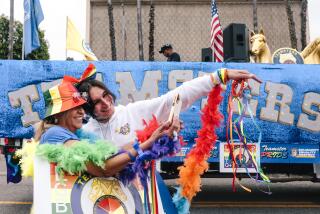Teamsters Counter U.S. Offer in Suit : Racketeering Case Proposal Allows Less Outside Control
- Share via
The Teamsters Union has made a counteroffer to the government in an attempt to settle the massive racketeering suit filed against the union by the Justice Department last June, according to knowledgeable sources.
The union’s proposal, as might be expected, would give the government considerably less control over the union than two Justice Department settlement offers that the Teamsters board rejected within the last five weeks.
In fact, the Teamsters proposal is so different from the Justice Department’s that one East Coast source said: “It’s like you’re trying to buy a beach house and they ask a million dollars and you come back with a counteroffer of $100,000.”
For example, the Teamsters assert in their proposal that the union has never been under the influence of the Mafia or any other criminal group. The government proposals would require the union to acknowledge that “there have been past problems with La Cosa Nostra corruption of various elements of the IBT (International Brotherhood of Teamsters).”
The union’s proposal does state, however, that it is the policy of the Teamsters and its officers not to knowingly involve any criminal group in the affairs of the union.
No Resignations
Another major difference is that no current members of the union’s executive board would be required to resign under the Teamsters proposal. Four members of the board--vice presidents Joseph Trerotola of New York; Joseph Morga of Hallandale, Fla.; Donald Peters of Chicago, and Theodore R. Cozza of Pittsburgh--would be required to resign under the Justice Department proposals.
The union’s proposal was presented to the government Thursday by five Teamsters lawyers, including the union’s general counsel James T. Grady, according to knowledgeable sources.
Grady declined to return calls Friday. Randy M. Mastro, the assistant U.S. attorney in charge of the racketeering suit, said he would not acknowledge having received the Teamsters offer. He said simply, “the government is preparing for trial.”
A trial in the government’s case is scheduled to begin in U.S. District Court in New York on March 13. The civil suit, filed under the Racketeer-Influenced and Corrupt Organizations Act (RICO), charged that the union is heavily influenced by organized crime and is no longer responsibly serving the interests of its membership.
The suit, the first such action filed against an international union in U.S. history, asks U.S. District Judge David N. Edelstein to oust the Teamsters top management, place the union under court trusteeship and bar certain alleged Mafia figures from any contact with the union or its officers. The Teamsters have decried the suit as an unconstitutional attack on freedom of association.
Under the Teamsters proposal, the government could install an “observer,” jointly chosen by the Justice Department and the union executive board, in the union headquarters until its convention 2 1/2 years from now. The observer would be paid by the Teamsters.
The observer would have the power to attend Teamsters board meetings, have access to union documents and records, make written recommendations to the board on alleged incidents of corruption and have a paid staff. The authority of the monitor would cease after the union’s 1991 convention.
The government proposed having three administrators installed at the union, with considerably more power, including the right to discipline officers or employees, institute trusteeships over local unions and veto any expenditure of the national union’s funds or the transfer of any of its property. The administrators would be in power through the union’s 1996 convention and the Labor Department would supervise all Teamsters national elections through 2011.
The Teamsters proposal also calls for the creation of a review board of three persons that would have the authority to hold hearings and implement solutions on alleged corruption in the union. The review board would be composed of one member appointed by the union, one by the government and one mutually. The board would operate at least until the union’s 1991 convention and its work would continue beyond that time if delegates at that convention voted to keep it operating.
Prospect of Reform
The union’s offer holds out the prospect of reforming Teamsters election procedures, but the proposed changes would have to be approved by delegates to the union’s 1991 convention. If the delegates approved suggested changes to the union’s constitution, there would be a direct referendum election of the union’s top two officers by secret ballot.
The government’s proposal also calls for direct secret ballot election of the union’s two top officers and also calls for the union’s vice presidents to be chosen by secret ballot at the convention. There would be no change in how union vice presidents are chosen under the union proposal.
Currently, the two top officers, president and secretary-treasurer, as well as 16 union vice presidents, are chosen by majority vote of delegates raising their hands at the union convention, which is held once every five years. The method of selecting delegates to the convention would also be changed under both proposals.
One source close to the Teamsters said the union’s proposal was based, in part, on federal court decrees that that had been entered in RICO cases brought against local unions in New York.


